|
Personal Service
Being of great age and infirmity, and with failing eyesight, I have taken advantage of a brilliant new scheme to have the latest Lee Child bestseller, Personal (now out from Bantam), read to me in a delicate whisper by Scarlett Johansson.
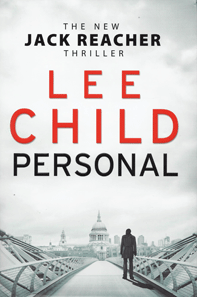 
The experience certainly enhanced my enjoyment of the book – a roller-coaster thriller with some great cliff-hanging ‘reveals’ which takes the ever-resourceful Jack Reacher to Paris and London – but I cannot claim credit for the idea, as it was suggested by the author himself on his impressive appearance on BBC’s Newsnight. For those who did not catch it, I believe it can be found on the jolly old interweb at http://goo.gl/4dzYrK and although Lee was making very sensible points on the subject of Amazon, book pricing and Kindles, I am afraid I was distracted soon after he mentioned Miss Johansson’s assisted-reading programme.
I have to thank Lee Child not just for an excellent, rip-roaring thriller, but for pioneering this new method of bringing an exciting reading experience to those of his fans who are elderly and frail. All I have to do now is wait for my blood pressure to go down.
Signing Session
I have always tried to follow the dictum of my old contubernalis Colin Dexter when it comes to signing books for paying customers: put whatever the customer wants (however embarrassing) in your neatest handwriting and conclude with a legible signature.
Now I have signed nowhere near as many books as Colin has (rumours that I have signed many as Colin are as yet unproven) and have always tried to explain to potential purchasers that an unsigned copy of one of my books may be more valuable in the long run. Yet I have always tried to sign books with a legible – if sometimes flamboyant depending on the hour – signature and so I was quite shocked to come across this one which proudly adorns a bestselling crime novel by an internationally-known crime writer:
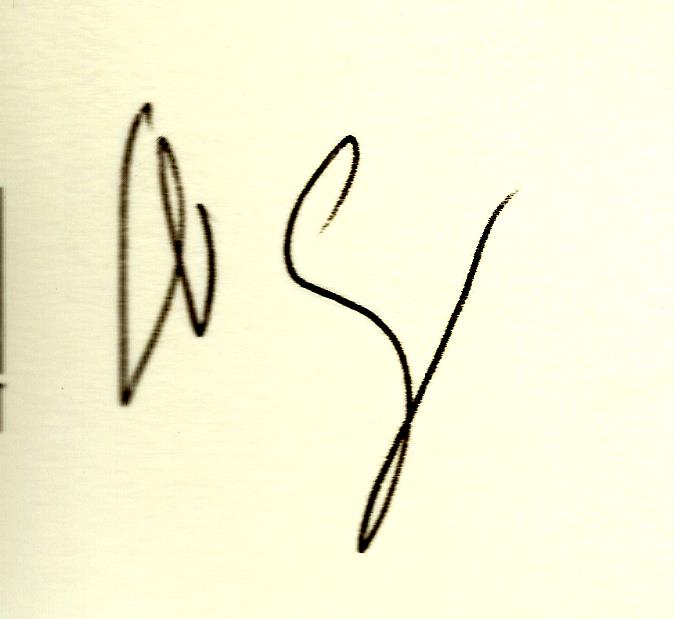
I have to say I feel rather sorry for the customer who bought a first edition hardback from this author (clearly a doctor in a past life) in 2004, paying the then princely sum of £14.99. I know this particular author must have had thousands of booksto sign, but you’d have thought they might have made a bit more of an effort.
If anyone can identify the author in question and can work out how to contact me c/o the CONTACT tab at the bottom right of the Shots home page (it’s not difficult), I will give a prize to the first correct answer. (Warning: the prize may well be one of my books – signed, of course.)
The Sultan of Storytellers
The title ‘Prince of Storytellers’ is commonly applied to Edward Phillips Oppenheim (1866-1946), who is said to have been responsible for some 13,000,000 words in his career as an author, but in descriptions of his lifestyle – a lifestyle he promoted in his fiction – the titles ‘Sultan’ or ‘Pasha’ seem to occur more often.
Oppenheim made a fortune out of popular fiction set among the lethargically rich (even his professional spies were multi-millionaires in private life) who enjoyed the finest wines, highest class of hotels, personal valets, hairdressers and manicurists, yachts and everything else which comprised the Riviera Touch, or at least what Oppenheim told his readers life was like on the Riviera. He enjoyed the life of luxury his characters did, but his readers could only aspire to, and is best remembered today as one of the founding fathers of spy fiction, or to be more accurate ‘spy fantasy’.
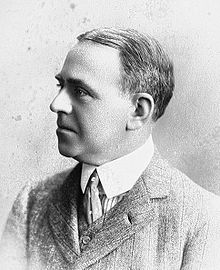
The British Library have now produced very attractive new editions of two of his thrillers, The Great Impersonation from 1920, which has been out of print for 25 years and The Spy Paramount from 1935, which has been out of print for more than 70 years.
Do they hold up today? Well, the first thing to say is that they are remarkably readable – if, that is, one can get past the casual racism of the first section of Great Impersonation which is set in German East Africa in 1914. The plot will not surprise anyone who has read The Prisoner of Zenda and the modern reader can be permitted a wry smile every time a door or a window is thrown open (there appeared to be no other way of opening a door in 1920) or when the hero thrusts his arms into a dressing gown or a smoking jacket. Most of the action takes place in hotel rooms, during banquets or at lavish society balls on the eve of WWI and in his marvellous study Snobbery With Violence, Colin Watson observed that Oppenheim’s massive success was down to “Selling glimpses of promised lands to others.”
(Oppenheim had a yacht on the Cote d’Azur - known locally as ‘The Floating Double Bed’ - which he retained for his extra-marital affairs. According to Colin Watson, Oppenheim would travel to a chemist in London to replenish his supply of condoms but “whether he was prompted to do so by tact or by residual patriotism one does not know….”)
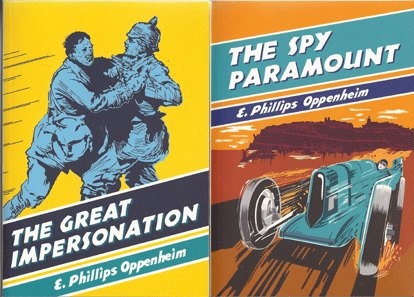
The Spy Paramount is again readable enough but requires a huge suspension of disbelief in following its fantastical grasp of European politics in 1934. An American spy (naturally of private means) finds himself redundant when the American ‘secret service’ (known as the M.I.B.C. whatever that stands for) is disbanded, presumably for lack of business. Martin Fawley, the rich spy with time on his hands, drifts into Rome and is immediately offered a job by the Italian secret service to spy on the French – naturally along the Riviera, where the casinos, golf courses, yachts and five star hotels are his favoured habitat.
In truth, his first bit of actual spying in the Alpes Maritimes is quite exciting, but soon our hero is trapped in a series of hotel suites being alternatively seduced (delicately) by femmes fatales (all of good breeding) and threatened by shady Germans in between visits from the hotel hairdresser. The settings switch from Monte Carlo to Berlin to London, then back to France and Rome, but the hotel rooms and the idle luxury remain the same until the final reveal of a French secret weapon – “the hellnotter” – which seems to be a death-ray designed to bring down aircraft. By this time, we’ve slipped into Conan Doyle’s Thrilling Tales territory.
What is fascinating is that the 1934 political background to all this is nonsensical. There is no mention at all of fascism, Mussolini or Hitler and indeed the book predicts a victory for the Monarchist party in the German elections, dedicated to restoring the Kaiser! The ending, where it turns out that our noble (and very rich, don’t forget) American hero simply – like a Miss World contestant – wants to work for world peace before sailing off into the sunset, is frankly daft.
It is slightly staggering to a cynical mind with hindsight, that The Spy Paramount could have been published in the year of the Nuremberg Laws, six years after Somerset Maugham’s Ashenden and in the year Eric Ambler began to write spy-fiction rather than spy-fantasy.
Oppenheim did leave one strong legacy, however, for all the trappings of envy he gave his heroes – money no object, beautiful women, fast cars, yachts, luxury hotels, even monogrammed hand-made cigarettes – were to become the trademarks of a certain James Bond in the 1950s.
The Best is Silence
Given the social upheaval, the violence and the international political ramifications, it’s rather surprising that the French Revolution has not provided the setting for more historical thrillers. However, there is one published this month, and it’s a very good one.
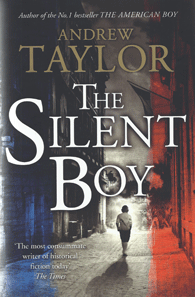
Andrew Taylor’s The Silent Boy (HarperCollins) is the sequel to his very impressive The Scent of Death, set in rebellious colonial America, in that it continues the adventures of the forlorn but very sympathetic hero Edward Savill whose career as a sort of civil servant brings him into contact with some dubious characters, many of them operating in what today we would call, with a wry smile, the ‘security services’.
The crux of the plot, though, is highly personal for Savill whose estranged and exiled wife is caught up in the revolutionary violence of Paris in 1792 and suffers a pretty horrible fate which is witnessed by her young, illegitimate son. It is this boy, catatonically mute after the incident and spirited to England, who becomes the focus of a three-way tug-of-war among parties who wish to claim him, or perhaps just make sure he remains silent about what he has witnessed.
The Silent Boy (which I believe is known as Silent Wounds in America) is an excellent historical mystery, well-constructed and superbly written in Taylor’s clean, uncluttered prose. Not only does Taylor maintain the suspense and make his (clearly) considerable period research fit seamlessly and unobtrusively, but he also gives us quite chilling insights into the traumatised psyche of the young victim of the title.
Return to the Fictional Fray
It’s good to see former chairman of the Crime Writers’ Association Russell James back on the crime fiction trail after several years where he has been busy with non-fiction projects on, among other things, the Victorian art world and excellent guides to both detectives and villains in British crime fiction. Yet I do not think Russell’s new novel is a return to his early criminous forays which earned him the title ‘the Godfather of British noir’ for excellent hardboiled titles such as Underground, Payback and Slaughter Music.
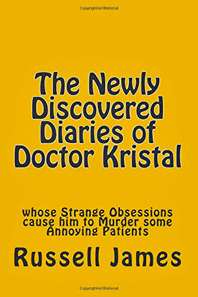 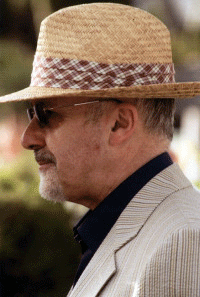
The Newly Discovered Diaries of Doctor Kristal, from newly formed Prospero Books, is a darkly comic psychological crime novel set in 1963 and written, as the title suggests, in diary form.
Six of the Best
It is good to see one of the Detection Club’s famous collaborative anthologies, Six Against The Yard, back in print in a splendid new edition from HarperCollins. Anything which puts the work of Margery Allingham, Anthony Berkeley, Freeman Wills Croft, Ronald Knox, Dorothy L. Sayers and Russell Thorndike between the same covers is to be welcomed.
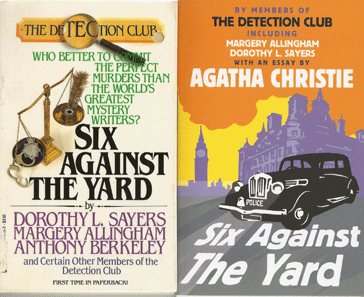
Originally published (I think) in 1948, Six Against The Yard is less well-known than the Detection Club’s Ask A Policeman and The Floating Admiral collections and has been out of print here for a long time. I, however, was fortunate enough to find a 1989 American paperback edition some years back, whilst on a fact-finding mission to the colonies.
See you, Barney
I am over a Caledonian moon to hear thatDouglas Lindsay’s anarchic, blackly comic and, above all, Scottish hero Barney Thomson (sometime barber and accidental serial killer) is to be immortalised on our cinema screens in 2015. I am told that filming has already begun of Douglas’ 1999 comic masterpiece The Long Midnight of Barney Thomson, though the film will be titled The Legend of Barney Thomson and will star Robert Carlyle (who also directs), Ray Winstone and Emma Thompson (in a key role if you know the book).

I take great pride in the fact that fifteen years ago I championed the first Barney Thomson books in Sherlock Magazine, Publishing News and the Birmingham Post – not that it actually did Douglas Lindsay much good. When a short-sighted and curmudgeonly (English) publisher dropped the series after three books, Douglas set up his own publishing company – Long Midnight Publishing – in Inverness, despite the fact that he was actually living in Warsaw at the time (I still stand by the rumour I started that he’s a spy) and more novels, novellas and eBooks followed, many of which have been covered in this very column.
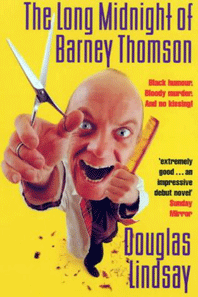 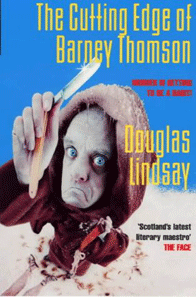
For several years I was an avid reader of a regular email from Douglas, then on active service in Warsaw posing, undercover, as a harassed parent of young children, which related with dry observational skill the perils of being (a) a father, (b) a Star Wars fan, and (c) a Scot abroad (or maybe just a Scot).
It was not until 2008 that I finally met Douglas Lindsay, at the traditional spies’ rendezvous in London’s Cambridge Circus, when he was in town to launch Lost in Juarez, his first non-Barney novel, or as he put it, his first venture ‘out of the barbershop’.
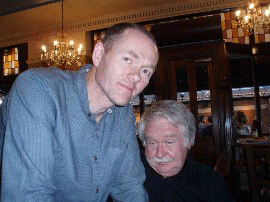
Since then, Douglas has been deeply involved in negotiations with Hollywood agents, in script conferences and with casting couches, but I am sure my invitation to the red carpet premier of the movie will be in the post…
The Far Side of the World Awards
For the first three years of its existence I had the honour to be one of the international judges for the Ngaio Marsh Award, presented for a crime novel written by a citizen or resident of New Zealand. It was not, as they say, an easy gig under the strict, eagle-eyed supervision of judging convenor Craig Sisterson, that dedicated advocate of Kiwi crime fiction and to be honest, I am rather glad to have been given time off for (reasonably) good behaviour, as I would really rather not have to pick a winner from this year’s short list.
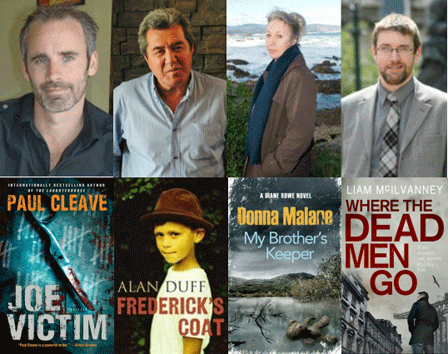
It was left to other, braver, souls than I to do the judging and they did just that on August 30th, where, in Christchurch, Liam McIlvanney (son of William) was declared this year’s winner.
The Ngaio Awards announcement clashed with this year’s Davitt Awards in Australia organised by Sisters-in-Crime Australia for female mystery writers but we have to wait until 6th September to hear who has won those other antipodean crime fiction prizes: the Ned Kelly Awards. My prediction is that Bitter Wash Road by Garry Disher will win the 2014 best novel category, but my predictions are, as many a bookmaker can testify, notoriously unsound.
The Tall Guy
I have no idea (honestly, for once) what I have done to offend one of the best, and certainly the tallest, young writers of spy fiction, Charles Cumming, as I have been a fan of his work for several years and indeed his China-set thriller Typhoon remains (after six years) one of my top recommendations on my page on the Fantastic Fiction website.
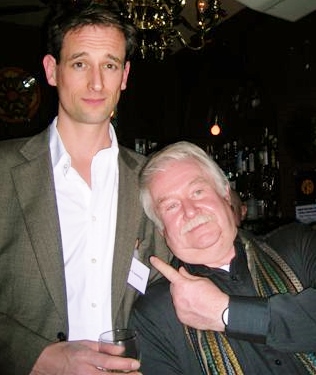 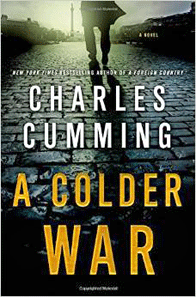
I was somewhat stunned to learn, from an American magazine, that Charles had new book out some months ago – A Colder War – and to be told by a colleague that a launch party had been held for the title in London in June. For legal reasons, I can say no more about either the party or, more importantly, the book.
Retrospective Discovery
I always take seriously the recommendations of Canadian bookman Steele Curry – a reader of considerable width and taste – even if they come tinged with sadness.
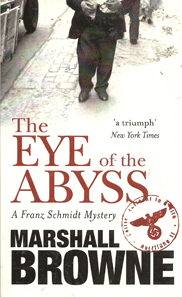
Until I read a piece by Steele in the latest issue of that learned journal CADS (Crime and Detective Stories, #68, August 2014) reporting his death, I am afraid I had never read anything by Australian author Marshall Browne. This is in part due to the fact that much of Browne’s more recent crime fiction has not been published in the UK, despite being well received in Australia and America.
Following Steele Curry’s recommendation (as I usually do), I hunted down an Australian edition of Browne’s 2002 novel The Eye of the Abyss, which is chillingly set in 1938 Germany and is really, really good. Quite why it was never published here will remain a mystery.
First War Drama
Whilst the majority of wartime thrillers tend to centre on the Second World War (and quite a few are mentioned here this month), in this centenary year it is fitting that we remember those based on the First World War.
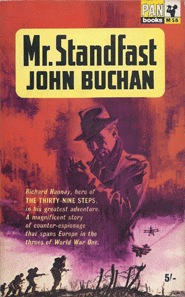 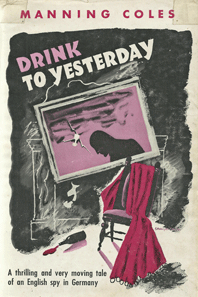
I am particularly looking forward to the new novel from Andrew Williams, whom I regard as one of the best of the younger generation of historical thriller writers. A spy story set on the Western Front in 1917,The Suicide Club is Andrew’s second foray into the Great War, following his highly impressive The Poison Tide in 2012,and will be published by Hodder & Stoughton in November.
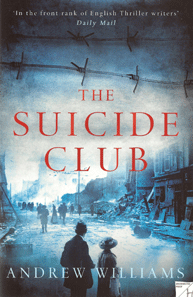
|
|
Playful Penguins
I have already made reference to those playful people in the Penguin marketing department who came up with a Penguin Crime ‘Top Trumps’ pack of cards which give crucial details about the crime writers in the Penguin stable.
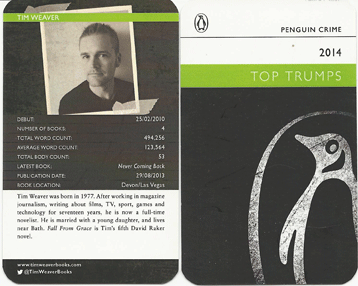
The Top Trump card for Tim Weaver, for instance, tells me that in his first four novels (since 2010), the body count totalled 53. I suspect that figure will have increased significantly by now, with the publication of Tim’s fifth thriller, Fall From Grace.
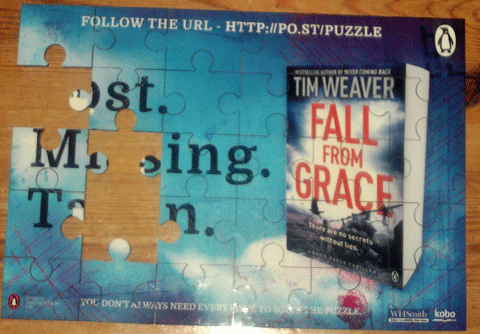
To celebrate and promote the new book, those perky Penguin people have gone one better than a pack of cards and produced a limited edition jigsaw which, rather intriguingly, has been distributed with two or three crucial pieces deliberately missing. I think this a bright and inventive piece of promotional material (missing pieces of a puzzle are, after all, what mystery fiction is all about), but I fear slightly for the sanity of those among my fellow reviewers who have already wasted many hours searching for the missing pieces under the sofa.
The Complete Airth
I am not by any stretch of the imagination a ‘completist’ – someone who simply has to have every book in a series (sometimes before they begin to read them) or every edition of a book. Very early on in my career I discovered completists from across the Atlantic who could not rest until they had acquired both UK and US editions of their favourite books and I did once know a completist who would buy the hardback edition of a crime novel to read and, if they liked it, then spend an inordinate amount of time and money tracking down a bound proof of the book.
I am, however, rather proud of my complete collection of Inspector John Madden mysteries - all four by Rennie Airth – which I have collected over the sixteen years it has taken the author to write them. My collection even includes a rare ‘sampler’ for the second in the series, The Blood-Dimmed Tide, published in 2001, although the actual novel (with a slightly different opening) did not actually appear until 2004.
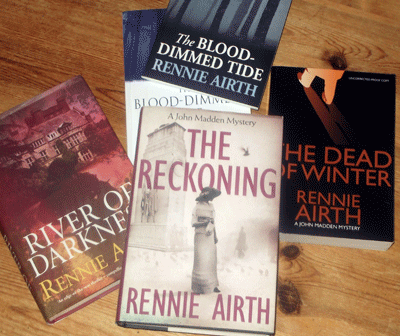
It all began, of course, with Rennie’s first Inspector Madden book, River of Darkness in 1999, an outstanding mix of a 1920’s country house murder mystery, the horrifying legacy of World War I and a tense police manhunt for a ‘serial killer’ long before anyone had coined the term. I well remember the rave reviews when the book came out (“A brilliantly crafted thriller” – Daily Telegraph) and it went on to win the Grand Prix de Littérature Policière in France and be nominated for several awards in America but remarkably failed to get noticed by the CWA’s Dagger Awards.
The second book moved Inspector Madden’s career on to 1932 and the third, The Dead of Winter (2009) was set in war-torn London in 1944. Now, with The Reckoning – just out from Mantle – former policeman Madden is again brought out of retirement to help his protégé, Scotland Yard detective Billy Styles, solve an execution-style murder in the tranquil Sussex countryside (though it is usually anything but tranquil in Airth’s fiction) in 1947.
There were rumours a few years ago that the BBC were considering filming the first two Madden books but, as far as I am aware, nothing came of the project. I cannot say I am unduly disappointed for the books stand on their own merit as “must reads” for any fan of top quality British (though written by a South African) crime fiction.
My Heart Cries Out Perfidia
James Ellroy successfully lifted the lid on the cess-pit that was Los Angeles and Hollywood in the late 1940s/early 1950s in his famous ‘L.A. Quartet’ which was published between 1987 and 1991. (My favourite of the Quartet was The Big Nowhere and I have to admit that I found White Jazz – a novel revered by French intellectuals – totally inaccessible.) Having dished all the dirt worth dishing on post war Hollywood, he now turns a very jaundiced eye on war-time LA and Perfida (beautifully published by Heinemann later this month) is Ellroy’s 700-page opening salvo in a new LA Quartet which begins on the very day the Japanese attack Pearl Harbour and America finally enters WWII.
As usual, Ellroy sprinkles real life characters in amongst his fictional cast of corrupt policemen, deviants, racists, druggies and gangsters so that you can’t see the join – if there ever really was one. Many are familiar from the first LA Quartet (which will eventually, I suppose, be classified Star Wars style as Volumes 5, 6, 7 and 8 if Perfidia is now Volume 1), especially the Machiavellian and quite hypnotic Dudley Smith although what Dudley gets up to pales in comparison to the antics of real-life American fascists such as Gerald K. Smith, who preached anti-Semitism (as did the better known ‘Father Coughlin’) on the radio with the enthusiasm of Josef Goebbels.
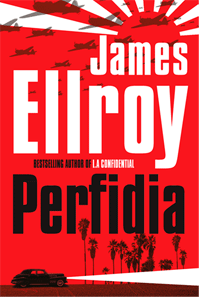
This being December 1941, paranoid American eyes seek out Japanese faces one of which belongs to Police department forensic chemist Hideo Ashida whom we meet as he attends as classic Ellroy crime scene – a quadruple homicide made to look like ritual suicide - just as, across the Pacific, the Imperial Japanese Navy launches its surprise attack.
Perfidia is, as you would expect, a brash, two-fisted tour-de-force of spleen and invective (did you think Ellroy could write quietly?) which holds up a cracked and tarnished mirror to a turbulent period of American history, when many things did change, but rooted problems of inequality and racism remained, as they still do. It’s powerful in scope, theme and character and it is delivered in Ellroy’s trademark scatological, Gatling Gun style which may, at times, seem to be a voice out of control, rather like a literary Tourette’s syndrome, but in fact rarely is as even random riffs highlight the roles of the men and women who did the dirty work for the rich and powerful.
Here, as an example, is Ellroy’s take on Harry Cohn, the real-life boss of Columbia Studios:
"Harry was an honorary white man. He ran Columbia tightfisted. The studio scrape doc was a lez named Ruth Mildred Cressmeyer. Ruthie owned a dyke slave den with Deputy Dot Rothstein. Ruthie botched a scrape on Bill McPherson’s coon squeeze and lost her M.D.’s license. Ruthie’s son Huey pulled heists and went to Bund meetings. Huey snitched for him. Huey sniffed glue. Huey was a grand psychopath."
If you follow all that, then you are already tuned in to Ellroy’s trademark poetic style. It might be ugly poetry, but it is definitely poetic and if he finishes this new ‘prequel’ quartet, which I am sure he will, then we might be talking epic poetry. Perhaps not Homeric, but for blood and guts, he could give Beowulf a run for its money.
Love it or hate it (and many will hate it), it is impossible to deny the power and energy that has gone into Perfidia, which is more than a crime novel whilst showing, at the same time, what the crime novel is capable of.
The more delicate souls among us might try reading it whilst listening to contemporary versions of the song ‘Perfida’ (My heart cries out Perfidia), either by the Glenn Miller Orchestra with Dorothy Claire or by the Benny Goodman Orchestra with Helen Forrest. For a cooler version, try that by Ibrahim Ferrer and the legendary Buena Vista Social Club.
Conspiratorially Speaking
I have always been a sucker, as our colonial cousins would say, for ‘conspiracy’ thrillers set during World War II – not straight forward war stories, but rather thrillers set during the war, or sometime after, revealing a terrible secret which has been hushed up.
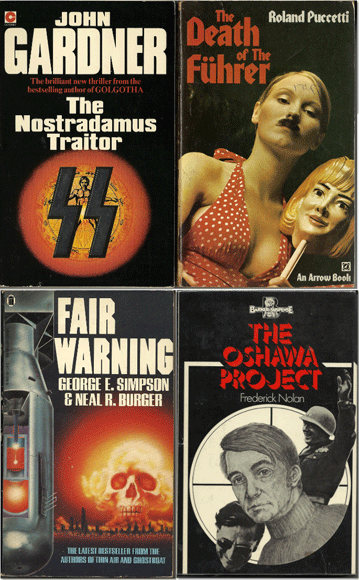
They have long been a staple of the thriller market here and in the USA and I am rather glad the tradition is continuing with the recent publication as a paperback original of The Samurai Inheritance (Corgi) by James Douglas, the pen name of the prolific Douglas Jackson, who I believe has published at least 11 novels in the last six years.
The plot involves a present-day “art recovery expert” (an awful lot of art experts seem to get involved in this type of thriller) and highly sensitive documents in the possession of Japanese Admiral Yamamoto at the time of his spectacular aerial assassination in 1943.
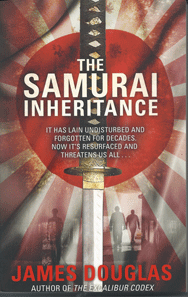
Being rather cynical about politicians, however, and without giving too much away, I am not too sure that the big reveal of this ‘lost piece of history’ would raise too many eyebrows today if it were true. Which of course, it might be…
Toffs, Barons, Gideon and lots, lots more
Dorothy L. Sayers once said something to the effect that crime writers who churn out two or three novels a year must either have problems with the Inland Revenue or an overactive thyroid. Julian Symons famously wrote ‘Most crime writers write too much, myself included’ which got him in to terrible trouble with the Crime Writers Association. The founder of the CWA, John Creasey, actually published something in excess of 600 titles and now a new biography of him is available, by Nigel Cawthorne, who has written a mere 150.
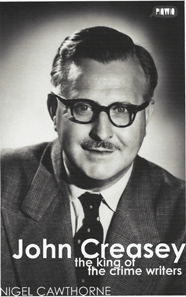
John Creasey –The King of the Crime Writers is published by Piqwiq and only available as a Kindle download (whatever that is) but can be easily found at: http://goo.gl/LPRILZ
The prolific John Creasey (1908-1973) was, at one time, synonymous with British crime fiction and with some of the hit TV shows of the 1960s, notably Gideon’s Way and The Baron. Given the many pseudonyms he used (J.J. Marric and Gordon Ashe being probably the best known), a monthly Mystery Magazine and a CWA Award named after him, not to mention all those books, at times he appears to have been a one-man industry. How odd then, or perhaps just the fickle finger of fate, that Creasey seemed to slip from memory so quickly after his death and nowadays even the CWA, which he founded in 1953, has dropped his name from their annual ‘New Blood’ award.
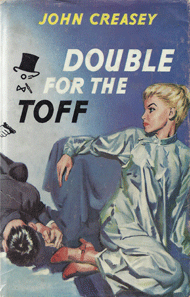 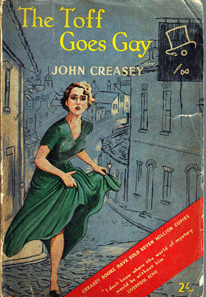
I’m not sure that Nigel Cawthorne’s biography answers that conundrum, and hardly mentions the Crime Writers Association, which is surely Creasey’s lasting legacy. I would also have liked to know more of how Creasey interacted with his direct contemporaries such as Peter Cheney and Berkely Mather, though neither are mentioned. Nor is critic and author Julian Symons, with whom Creasey was known to have had several run-ins. But there is much fascinating stuff about how Creasey reacted to a fairly damning review of one of his earliest books by Dorothy L. Sayers in the Sunday Times in the 1930s (and DLS could be very damning when she set her mind to it) and also his long-standing rivalry with (and jealousy of) Agatha Christie.
Even more interesting – though it has little to do with crime fiction – is the story of John Creasey the would-be politician, of which I was blissfully ignorant until Nigel Cawthorne’s book. In the mid-1960s, Creasey formed and funded a political party which advocated government by ‘a ministry of all talents’ cutting across traditional party lines and he stood (unsuccessfully) at several by-elections as an All Party Alliance candidate.
Creasey certainly took his politics seriously and to make time for them, declared that he would cut his fiction workload from 15 novels a year to eight! Although he never saw himself as a future Prime Minister, perhaps it was his proposed Cabinet which put people off voting for him, as he had pencilled in (I’m guessing without their knowledge) Harold Wilson as Chancellor of the Exchequer, Jeremy Thorpe as Home Secretary and – best of all – the Duke of Edinburgh as Foreign Secretary!
Pick of the Paperbacks
Fans of Jack Bauer, the 24 franchise and the new series (some of it, I believe, set in London) will be delighted that Titan Books have just published 24 – Deadline by James Swallow, whereas fans of the late James Gandolfini will enjoy the book on which his last (?) film was based, The Drop by Dennis Lehane, published this month by Abacus.
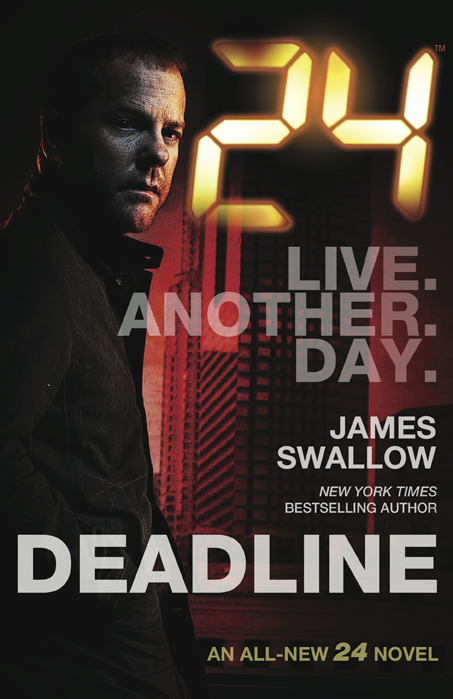 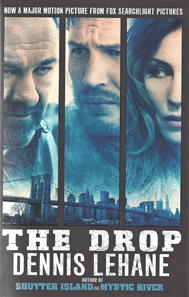
Fans of Tania Carver will already know that she is in fact author Martyn Waites but may be pleasantly surprised the she/he has a new book out this month, Truth Or Dare from Sphere. Whilst naturally I wish it well, I already have a very fine crime novel with that title in one of my libraries here at Ripster Hall, a 1973 chiller by Jaqueline Wilson.
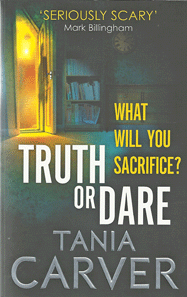 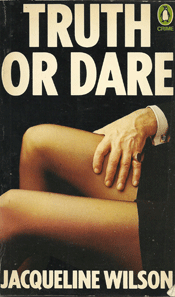
Whilst signing my copy of her book, Miss Wilson confided to me that this was her favourite cover of any of her crime novels though I believe she only wrote four before moving on to other projects. She was such a nice person; I wonder what became of her…
Another Italian Job
For years the books of Italian crime writer Marco Malvaldi were not available in English and then, like London buses, three of them come along at once in 2014.
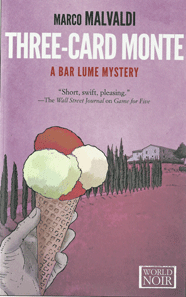
The latest is Three-Card Monte from Europa Editions, which features Malvaldi’s regular cast of elderly bar-flies, voluptuous barmaids and the cynical barrista Massimo Viviani from the Bar Lume, a local boozer/gossip hub in a small Tuscan town near Pisa, getting involved in the suspicious death of a Japanese scientist attending an international conference.
Malvaldi has already been hailed as “Camilleri’s heir apparent” by my young apprentice Jake Kerridge of the Daily Telegraph (so it must be true) and his gentle humour shines through the potential minefield of translation. One reference, however, may need to be clarified for the non-Italian, non-football following reader, if there is such a thing.
Referring to famous battles of wills between strong personalities, Malvaldi cites the examples of Caesar and Antony, Churchill and Stalin and…Zidane and Materazzi….
Now this latter reference may puzzle anyone unfamiliar (Americans, for instance) with the famous incident when French footballing genius Zinedine Zidane head-butted Italian defender Marco Materazzi during the 2006 World Cup final. Truly, a case of an irresistible force meeting an immovable object and an incident which is taken very seriously in Italy. Indeed in Tuscany, just up the coast from where Marco’s Bar Lume series is set, in the town of Pietrasanta, a very large statue commemorating the event dominates the main piazza.
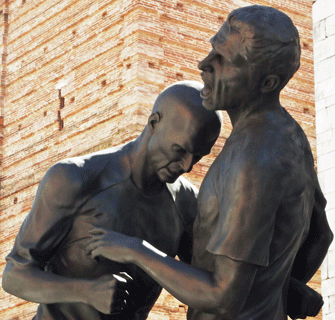
Light (Reading) Lunch
It is an honour to feature on the Face Book (though I’m not quite sure what that is) of American mystery writer Margaret Maron, who will be receiving a much-deserved Lifetime Achievement Award at next year’s Bouchercon in her native state of North Carolina.
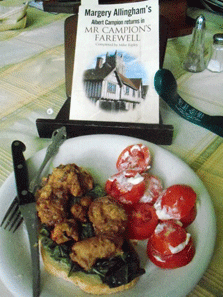
Margaret is describing her perfect summer lunch – “sautéed chicken livers with fresh tomatoes and basil and a delightful new book.”
Buon appetito!
The Ripster
|